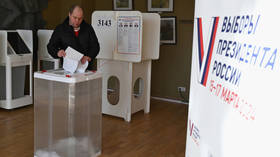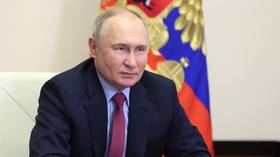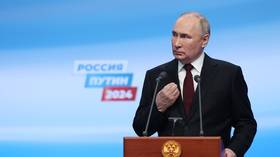Glenn Diesen: Western media ‘coverage’ of Russia is incredibly dangerous, and it’s getting worse
Glenn Diesen: Western media ‘coverage’ of Russia is incredibly dangerous, and it’s getting worse
The self-deception practiced by journalists writing about the country is leading to dire consequences
By Glenn Diesen, Professor at the University of South-Eastern Norway and an editor at the Russia in Global Affairs journal.

FILE PHOTO: A man casts his ballot at a polling station during the presidential election in Moscow, Russia. © Sputnik / Maksim Blinov
20 Mar, 2024
Western media coverage of every Russian election is bad. But this time it was even worse than usual.
Instead of lashing out at the incompetence on display, it’s more constructive to explore why rational discussions about the country continue to appear impossible.
Not to mention the dire consequences of the ongoing self-delusion.
Reason versus conformity to the group
One of the first things we learn in sociology is that humans are in a constant battle between instincts and reason. Over tens of thousands of years, we have developed the instinct to organise in groups as a source of security. This is the result of evolutionary biology as survival demands that we organise into “us” versus “them”. In-group loyalty is augmented by assigning contrasting identities of the virtuous “us” versus the evil “other”, which helps stop an individual from straying too far from the pack.
Yet, human beings are also equipped with reason and thus the ability to assess objective reality independent of their immediate circle. In international relations, it’s imperative to place yourself in the shoes of the opponent. The rationality required to see the world through the perspective of the “other” is vital for reaching mutual understanding, reducing tensions, and pursuing a workable peace.
Every successful peace process and reconciliation in history – from Northern Ireland to negotiations to end apartheid in South Africa – has been based on this.
 READ MORE: Putin scores historic win in Russian presidential election – official results
READ MORE: Putin scores historic win in Russian presidential election – official results
We expect journalists to be objective in their reporting of reality, which is especially important during war. But this seems to be almost impossible, especially during conflicts. When human beings experience external threats, their herd instincts are triggered as society demands group loyalty and we punish those who deviate. The political obedience demanded during war time usually results in the weakening of freedom of speech, the role of journalism, and democracy.
Why did Russians vote for Putin?
So, how can we understand the reasons for President Vladimir Putin’s immense popularity in Russia and his landslide victory?
If we use our reason and resist our tribal instincts, it should not be difficult to understand the popularity of Putin. While the 1990s was a golden period for the West, it was a nightmare for Russians. The economy collapsed and society disintegrated with truly horrific consequences.
The country’s security also collapsed, as NATO expansion meant there was no chance to agree an inclusive European security architecture. This had been outlined in the Charter of Paris for a New Europe in 1990 and the OSCE founding documents.
A weakened Russia meant that its interests could be ignored, and NATO was able to invade Moscow’s ally Yugoslavia, in violation of international law.
When Putin took over the presidency on 31 December 1999, it was commonplace in the West to predict that Russia would share the fate of the Soviet Union. That is eventual collapse.
However, Russia has instead become the largest economy in Europe (by PPP), its society has healed from the disastrous 1990s, its military might has been restored, and new international partners have been found in the East and Global South, as evidenced by the growing role of BRICS.
Furthermore, most Russians believe it’s not a good idea to have major disruptions to leadership in the middle of a NATO-Russia proxy war in Ukraine that is deemed an existential threat. Don’t change horses in midstream as the American proverb, often attributed to Abraham Lincoln, advises.
Speaking of the US, the late Mikhail Gorbachev – who was immensely popular there – did not shy away from criticising Putin, when he was still with us. However, he nevertheless argued that Putin “saved Russia from the beginning of a collapse”.
Today, any Western journalist repeating this would be immediately branded as a “Putinist” – implying a betrayal of the “us”. Western journalists cannot acknowledge the immense achievements of Russia since 1999 as it could be interpreted as lending legitimacy and signalling support for the “bad” side.
The price of self-delusion
 READ MORE: Putin’s dream, Russian unity, conflict with NATO: Key takeaways from victory speech
READ MORE: Putin’s dream, Russian unity, conflict with NATO: Key takeaways from victory speech
Arguments are not judged by the extent they reflect an objective reality, rather they are assessed by how they are seen to express support or condemnation of Russia. Conformity to a narrative signals in-group loyalty, and the desire to deprive opponents of legitimacy limits what is allowed to be discussed.
Acknowledging Putin’s achievements over the past 25 years is treated as expressing support for him, which is tantamount to treason.
Meanwhile, journalists hardly ever discuss Moscow’s security concerns and the extent to which our competing interests can be harmonised. Instead, Russian policies are conveyed by referring to derogatory descriptions of Putin’s character.
As in our other wars, conflicts are explained by the presence of a bad man and if we could just make him go away, then the natural order of peace would be restored. Putin, the narrative contends, is our most recent reincarnation of Hitler and we constantly live in the 1940s where an adversary must be defeated and not appeased.
How can journalists then explain to their audience Putin’s popularity and the reasons for his huge personal vote when it is not allowed to say anything positive about the Russian president? Unable to live in reality and unable to place ourselves in the shoes of the opponent – how are we supposed to have sensible analysis and policies? As I always warned my students of international relations: Do not hate your rivals, it produces poor and dangerous analysis!
Making self-delusion virtuous comes at a high price. How can the West pursue diplomacy and work with Putin when he is presented as the embodiment of evil and an illegitimate leader? Even explaining Russian policies is condemned as legitimising Russian policies, which is deemed to be propaganda that must not be given a platform. People conform to the good versus evil mantra as it feels virtuous and patriotic to signal that they support the in-group and loathe the out-group. But how can we pursue our interests when we have committed ourselves to self-delusion and have banned reality from our analysis?
 READ MORE: Moscow responds to West’s election criticism
READ MORE: Moscow responds to West’s election criticism
I have attempted to explain for two years why the anti-Russian sanctions were doomed to fail and why Russia will win the war, only to be told that it is Russian propaganda to undermine support for sanctions and to challenge the narrative of a pending Ukrainian victory. Reality be damned! Ignoring reality results in a distorted picture of Russia which predictably leads to miscalculations. How could Russia as a “gas station masquerading as a country” defeat the most draconian Western sanctions and see its economy not only survive, but by some measures even thrive? Why would Russians unite under an existential threat when we cannot acknowledge the role played by NATO in that regard?
Sigmund Freud explored the extent to which instinctive group psychology could diminish the rationality of the individual. Freud’s ideas were further developed by his nephew, Edward Bernays, who became the father of modern political propaganda. Over a century ago, Walter Lippman cautioned group psychology, managed with propaganda, as it came with a heavy price. Yielding to the instinct of viewing conflict as a struggle between the virtuous “us” versus the evil “other” implies that peace requires defeating the adversary, while a workable solution becomes tantamount to appeasement.
What better explains the current failure of rational analysis and the resulting collapse of diplomacy?
You can share this story on social media: Source: rt.com
Anyone can join.
Anyone can contribute.
Anyone can become informed about their world.
"United We Stand" Click Here To Create Your Personal Citizen Journalist Account Today, Be Sure To Invite Your Friends.
Please Help Support BeforeitsNews by trying our Natural Health Products below!
Order by Phone at 888-809-8385 or online at https://mitocopper.com M - F 9am to 5pm EST
Order by Phone at 866-388-7003 or online at https://www.herbanomic.com M - F 9am to 5pm EST
Order by Phone at 866-388-7003 or online at https://www.herbanomics.com M - F 9am to 5pm EST
Humic & Fulvic Trace Minerals Complex - Nature's most important supplement! Vivid Dreams again!
HNEX HydroNano EXtracellular Water - Improve immune system health and reduce inflammation.
Ultimate Clinical Potency Curcumin - Natural pain relief, reduce inflammation and so much more.
MitoCopper - Bioavailable Copper destroys pathogens and gives you more energy. (See Blood Video)
Oxy Powder - Natural Colon Cleanser! Cleans out toxic buildup with oxygen!
Nascent Iodine - Promotes detoxification, mental focus and thyroid health.
Smart Meter Cover - Reduces Smart Meter radiation by 96%! (See Video).





